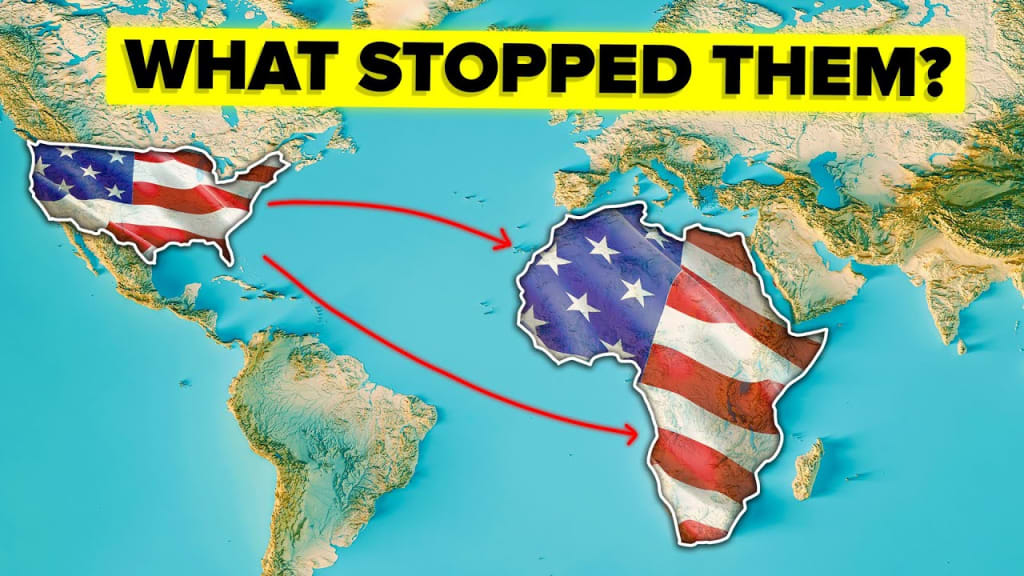What was the rationale for America's unwillingness to colonize Africa?
Over its almost 250-year history, the United States has attacked and colonized various islands, territories, and countries, but it has never established a presence in Africa like other European nations. What deterred America from entering Africa? Find out on this surprising new narrative

What Stopped Them? 👀🏴☠️🤯
Over its almost 250-year history, the United States has attacked and colonized various islands, territories, and countries, but it has never established a presence in Africa like other European nations. What deterred America from entering Africa? Find out on this surprising new narrative.👀🏴☠️🤯
- Over the course of its nearly 250-year history as a nation, the United States has invaded and colonized a great number of islands, territories, and nations. Africa was the target of colonization by many nations in the late 19th and early 20th centuries. The nations of Europe literally fought over territory in order to profit from the continent's resources and populace. Africa was colonized at a rate never before seen on Earth. Therefore, why did the United States opt out of the race for Africa? The answer is not what you might expect. The idea that the Democratic Republic of the United States would ever colonize and oppress people in other parts of the world, as Britain had done to the 13 American colonies, is widely rejected in the country. But over the years, it has indeed accomplished that.
- Fascinatingly, the U.S. possesses every attribute of an empire. Islands like Guam, American Samoa, and Puerto Rico are still under US control. Although technically a part of the United States, none of these territories enjoy the same rights or access to funding as states do. Simply put, U.S. territories are simply another name for U.S.-owned lands. The purpose of colonies has traditionally been to supply the colonizing country with resources or a source of revenue. This was the motivation behind the colonization of Africa, and the United States replicated it in some regions of Latin America and the Pacific. Why, then, did the U. Before we can answer this question, we need to look at who ended up colonizing Africa and why.
- Did anyone ever attempt to do so when it was obvious that doing so would be profitable? This, coupled with what was going on in the U. Answering this intriguing question requires an understanding of S. at the time. Between 1885 and 1914, when European powers started rapidly colonizing the continent, it was known as the "Scramble for Africa." Only a few small colonies founded by the Portuguese and Dutch existed along the continent's coast up until this point in history. During the Slave Trade, the majority of the ports and European settlements in Africa served as staging areas for the transatlantic transportation of Africans. Undoubtedly, this was one of the darkest eras in human history.
- The need for a new source of income increased as more and more European nations outlawed the use of slaves and the trade in slaves became prohibited in most of the world. Without free labor, prices for goods immediately began to rise. Due to this, European powers began to focus their attention on Africa, the largest and most important continent in terms of distance from colonial powers. These territories came to be seen as more trouble than they were worth as colonies in the Americas continued to rebel against their European overlords on the other side of the Atlantic. European powers started concentrating on the largely unexplored continent directly to their south because it was difficult to maintain colonies that were an ocean away.
- The vastness of the continent's deserts, the thickness of its jungles, and the dearth of infrastructure presented a number of challenges to exploring the middle of Africa, though. This implied that European explorers had, for the most part, consistently avoided venturing far from the coast. But by the 19th century, a growing number of private initiatives were started in Africa for a variety of reasons. The infamous city of Timbuktu was the target of an expedition into the heart of the continent, funded by the African Association, which was founded by several extremely wealthy Englishmen. The mapping of the Niger River, which would later be used by subsequent expeditions to delve deeper into Africa, was a byproduct of this expedition.
- As time went on, exploration in Africa shifted from trying to find lost cities to seeking out resource-rich areas to colonize. The United States was doing the same thing as European powers during this time period. However, for the most part, they stuck to the exploration of the western part of North America. Following the 1803 Louisiana Purchase, the United States' territory appeared to have doubled overnight. There was a lot of land to inventory and resources to take stock of. Slavery was still legal in the U.S., and even though the nation had aspirations beyond its own borders, the early U.S.S. considered Africa to be their primary source of enslaved labor. When there was so much to do at home, the wealthy corporations and the American government had no interest in discovering or colonizing the African continent.
- However, European countries urgently required resources to meet the demands of their wealthy and middle-class citizens. Since there was very little undeveloped land left on the European continent, they needed to look elsewhere to find the resources needed to keep their economies running. The dense and growing population of the continent had all but used up its limited resources, which was one of the reasons that Europe needed colonies so desperately. Although the US itself did not play a role in the colonization of Africa, one of its citizens did. In the second half of the 19th century, Henry Morton Stanley, who would later become a naturalized American citizen, was tasked with finding Doctor Livingston in the deep jungles of Africa.
- To be fair, Stanley was actually working for King Leopold II of Belgium, not the United States, during his exploration of Africa. At the same time he was searching for Dr. Livingston, Henry Morton Stanley was also given the assignment to secure treaties with local chieftains along the Congo River to create a Belgian colony in Africa. The Belgian government did not have enough money to fund a large-scale colony in Africa, which led them to only secure the Congo. However, other countries in Europe had the means and the money to stake claims on the African continent. Stanley's expedition brought word back to Europe that there was opportunity there, leading other governments to send their own envoys to secure land on the continent.
- As the 19th century neared its end, the American Civil War led to the abolishment of slavery in the United States, leading slave trading companies in Europe to pivot their strategies to more legitimate forms of trade. The United States had been torn apart by the Civil War and would spend the next several decades rebuilding the country and expanding its territory further west. This would eventually lead to a war with Mexico, which would result in more land being acquired by the U.S. What this meant was that the U.S. was concentrated on colonizing North America and couldn't care less about what was going on in Africa. European nations, on the other hand, saw the African continent as a new venture where they could make large sums of money by setting up plantations for cash crops, which could then be shipped back to Europe and around the world.
- The products they were after included rubber, coffee, sugar, and timber, among many other goods that could not be procured in Europe. But perhaps one of the biggest reasons that this was the perfect time for European nations to colonize Africa was due to advances in transportation. In particular, the advancement of steam engines allowed for faster train and ship travel. Iron-hulled vessels and steamships could now navigate shallower waters, allowing them to travel along the rivers of Africa. This, combined with the construction of railroads across the continent, allowed for easier transportation of goods to the coast, where they could be sent back to Europe.
- Advances in propulsion were not the only new technology that allowed Europeans to colonize Africa. Deadlier weapons were designed, and groundbreaking advances in medicine meant that malaria could be treated, allowing Europeans to survive in the harsher environments of Africa. Up until this point, Africa had been known as the "White Man's Grave" due to the high mortality rates from malaria and yellow fever on the continent. These advancements allowed Europeans to not just explore, but thrive in Africa. Between the 1880s and 1920s, European countries carved out colonies in Africa, ravaged the lands, and exploited the people living there. It was a different kind of atrocity than the slave trade, but an atrocity nonetheless.
- By the early 20th century, seven different countries had colonies in Africa, but the United States wasn't one of them, or was it? Although the United States did not colonize Africa in the same way as the nations of Europe did, saying that the U.S. didn't have any colonies on the continent isn't entirely accurate. In 1847, the United States founded a small colony in Africa. The purpose of this colony was not to acquire slave labor or exploit resources; instead, a group of white Americans founded a corporation called the American Colonization Society that had one goal: to resettle black people back in Africa. They planned to do this by founding the colony of Liberia. Make no mistake; the ACS was not helping black people return to their homeland out of the kindness of their hearts.
- In reality, they had some pretty messed-up reasons for creating their colony in Africa. The American Colonization Society was created as part of a plan to deal with what they considered a problem brewing in the United States of America. That problem was black people. Many believed there was no way that free blacks and whites could coexist in society. Obviously, this was a terrible and incredibly racist way to think. The crazy part was that many of the people who thought this way and were founders of the ACS were abolitionists. The American Colonization Society was made up of a group of white men with differing ideas about black people. The organization consisted of both slave owners and abolitionists, and as time progressed, many of the latter eventually rejected the idea that black and white people would never be able to coexist in society together.
- However, this did not stop the ACS from eventually starting their colony in Africa. The organization was made up of some very powerful and rich men who made sure that the colonists were well supplied. In 1818, the ACS sent two representatives to western Africa, where they negotiated with local leaders on the price of their land. Two years later, 88 free black settlers from the United States, along with three members of the American Colonization Society, set sail for Sierra Leone, where they would bring a signed constitution to ensure the new colony would be settled under U.S. laws. The first spot that the new colonists landed was Scherbo Island, just off the coast of Africa.
- Unfortunately, the colonists were ravaged by malaria, and many died. Then, in 1821, a United States Naval ship carrying more settlers made it to the coast of Africa and continued the mission of the ACS. Upon disembarking from the ship, the colonists began looking for a more permanent settlement. They decided to set up shop in present-day Liberia. The native people initially refused to sell their land to the Americans, but eventually a naval officer wore down one of the chiefs, who agreed to sell them a strip of land.






Comments
There are no comments for this story
Be the first to respond and start the conversation.